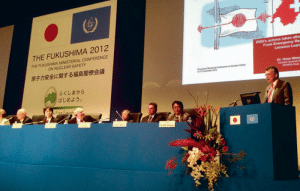ENSI adopts a strategy for international cooperation
The Swiss Federal Nuclear Safety Inspectorate (ENSI) has drawn up a strategy for international cooperation. Key aspects of the work with other countries and international bodies are defined in this strategy, which will also enable ENSI to play its part in improving nuclear supervision on a continuous basis.
 ENSI’s Director General Hans Wanner explains: “International cooperation is constantly becoming more important as a factor in the supervision of nuclear facilities. This is why ENSI takes part in numerous international bodies, where it advocates increased nuclear safety throughout the world”.
ENSI’s Director General Hans Wanner explains: “International cooperation is constantly becoming more important as a factor in the supervision of nuclear facilities. This is why ENSI takes part in numerous international bodies, where it advocates increased nuclear safety throughout the world”.
The new international strategy has been approved by the ENSI Board. It defines the objectives that ENSI pursues at international level, the viewpoints it represents in committees and other bodies, and the key aspects on which it focuses its activities.
At international level, ENSI pursues four strategic objectives:
1. Presence
- ENSI is represented in the main international bodies that focus on the exchange of information and experiences, on the latest advances in science and technology, and on harmonising safety provisions and requirements.
- In these bodies, ENSI spearheads the ongoing improvement of nuclear supervision on a global level, thereby fulfilling its responsibilities together with other relevant players at federal level.
2. Transparency
- ENSI informs the public about its international activities. For this purpose, it reports the results of international conferences, developments concerning science, technology, international standards and regulations, and lessons learned from occurrences in nuclear plants outside of Switzerland.
- ENSI publishes Switzerland’s periodic country reports regarding compliance with international agreements and conventions, and the reports by international experts who periodically review ENSI itself or Switzerland’s nuclear facilities to determine their compliance with IAEA requirements.
- At international level, ENSI is committed to ensuring that knowledge acquired about nuclear safety issues is communicated transparently.
- ENSI also advocates an open and constructive international exchange of experiences.
3. Expertise
- ENSI’s employees are familiar with the latest international developments in science and technology in their specialist areas.
- By contributing its expertise in international bodies, ENSI aims to play its part in the development of international safety provisions and to support safety-oriented requirements.
- ENSI fosters the ongoing development of science and technology through its contributions to regulatory safety research and its participation in the major international specialist bodies.
- ENSI’s regulatory framework and supervisory activities take account of current international safety provisions as well as lessons learned from important occurrences and findings from inspections in foreign nuclear facilities.
4. Independence
- Switzerland fully meets the IAEA’s requirements for the effective independence of government supervision of nuclear facilities and materials.
- ENSI consults internationally recognised experts to obtain second opinions on supervisory decisions so that they are supported by a broader basis of technical expertise.
- ENSI systematically verifies whether the Swiss regulatory framework for nuclear safety and security meets the latest international standards, and it invites periodic reviews by international experts to determine whether it meets the IAEA requirements.
- At international level, ENSI advocates that nuclear supervisory authorities should be set up independently and that they should also be able to act independently.
- ENSI encourages the international community of states to carry out independent international review missions of national supervisory authorities and nuclear facilities.
Recognisable benefits for Switzerland
Active participation in the international exchange of information and experience is important for ENSI’s supervisory work as it helps to maintain expertise and derive lessons from important occurrences and findings from inspections in foreign nuclear facilities. As well as gaining knowledge for its own supervisory work, ENSI benefits from international cooperation because it allows Swiss concerns to be represented in international provisions on nuclear safety and security.

